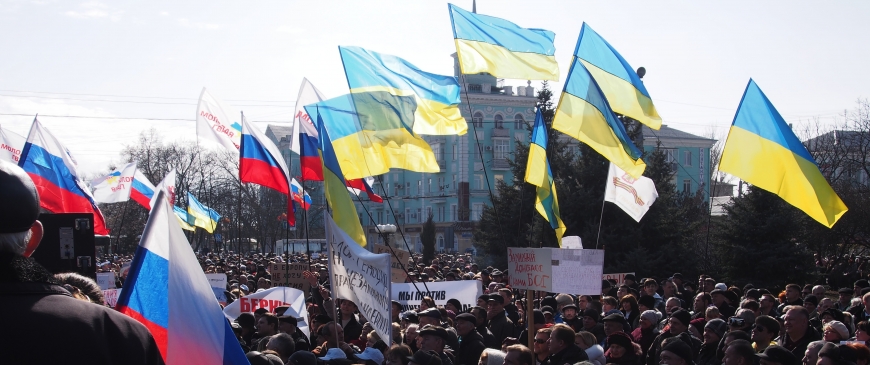
Pressure from Macron and Merkel on Russia is crucial to ending the war in eastern Ukraine
Five years after Russia and its proxies invaded eastern Ukraine, a fresh peace initiative is raising hopes of a solution to the Donbass conflict that has claimed 13,000 lives and left more than 30,000 injured.
Today’s summit in Paris will see the leaders of Ukraine, Russia, Germany and France meet for the first time since Berlin three years ago, when they failed to agree how to end the simmering conflict in eastern Ukraine. The meeting is promising, but Western pressure on Russia will be crucial to finding a solution.
The road to this new summit has been long and bumpy. Russia annexed Crimea and destabilised the eastern border region of Ukraine in spring 2014. Within months, the leaders of France and Germany launched an initiative to settle the Donbass conflict through dialogue with the presidents of Russia and Ukraine. It became known as the Normandy format, after the group met for the first time during the 70th anniversary commemorations of the D-Day allied landings.
Peace talks in the capital of Belarus gave rise to the Minsk Protocol in late 2014, but the conflict rumbled on regardless.
An impasse between leaders lasted until the election earlier this year of president Volodymyr Zelensky, a comedy actor and TV producer with no political experience who promised to end the conflict. His fresh push on the peace talks resulted in a new ceasefire, which has reduced civilian deaths despite numerous violations.
By mid-November, disengagement of forces had been carried out in three areas and Ukraine also agreed to grant the contested territories a special status once free and democratic local elections are held there. Despite domestic opposition, Zelensky compromised enough to get the Russians on board with the Paris summit.
But the role of French president Emmanuel Macron and Germany’s Chancellor Angela Merkel’s will also be crucial. Besides the EU’s strategic interest in having Ukraine, one of its largest neighbours, stable and prosperous, both leaders have a personal interest in resolving the conflict.
Macron wants to engineer an improvement in relations between the EU and the Kremlin, but this ambition sits uneasily with Russia’s continued aggression in Ukraine. For Merkel, who is planning to retire after the 2021 federal elections, ending the Donbass conflict has long been a foreign policy priority. Securing peace in Ukraine, while maintaining a principled German (and EU) position towards Russian president Vladamir Putin, would mark a significant achievement before she steps down.
While neither Macron nor Merkel will want to leave the negotiating table empty-handed, they should not compromise on the core aspects of the conflict or allow Moscow to fob Zelensky off with minor concessions. The latter might include a Russian agreement to release Ukrainian political prisoners, commitments to engage with Ukraine in other areas such as gas transit talks, or returning assets from the occupied territories.
Macron and Merkel should focus on upgrading the Minsk agreements with a clear sequence and timetable for implementation. France and Germany should explicitly recognise that elections cannot be held in the occupied Donbass territories until Ukraine regains control over the full length of its state border, and until illegal armed groups are disarmed.
Crucially, there should be no question of lifting sanctions or re-engaging politically with Russia (including in the G7/G8 format), until Putin has met his side of the bargain. The European leaders must also not allow the Donbass talks, regardless of the outcome, to alter their stance on the annexation of Crimea, including the related sanctions.
The Normandy parties will also need to agree which organisations should be involved in administering the temporarily occupied areas for a transitional period. The specifics of Donbass’ reintegration will also need to be defined at the summit, given that the existing Ukraine legislation on special status expires in the end of the year.
The Western powers should watch closely for any Russian moves to stoke tensions in the breakaway territories, and prepare suitable responses. The recent ‘passportisation’ policy, which has already granted 170,000 Donbass residents Russian citizenship, is particularly destabilising and reminiscent of what Russia did in the Abkhazian and South Ossetian regions of Georgia to justify its military intervention there.
Ukraine’s economic health and institutional resilience remain crucial for the country’s capacity to deal with the consequences of the conflict. Ukraine’s partners – in particular the EU, which has provided more than €15bn of support since 2014 – has helped the country to avoid collapse. They should continue this support, with a focus on economic development, judicial and anti-corruption reforms, and strengthening national security and energy independence.
Donbass is not a lost cause, but the longer the conflict lasts, the harder it will be to resolve. The fundamental obstacle to peace is Putin’s determination to keep Ukraine destabilised to hamper its aspirations to join the EU and Nato, and prevent it from being seen as an example of a successful post-Soviet democracy. As a result, counting on Putin’s goodwill to resolve the conflict is pointless.
But economic sanctions continue to provide Western leaders with leverage. The combination of Russia’s weak economic growth and growing domestic demand for change may prompt Putin to agree for some concessions in Donbass. After all, Russians do not have as strong an attachment to Donbass as they do to Crimea.
As Western pressure remains crucial to finding a solution, France and Germany should enforce Ukraine’s red lines in Paris. History will not judge Macron or Merkel kindly if they act like the British Prime Minister Neville Chamberlain and proudly declare “peace for our time”, only for there to be further hostilities.
Khrystyna Parandii is the Clara Marina O'Donnell Fellow (2019-2020) at the Centre for European Reform.
